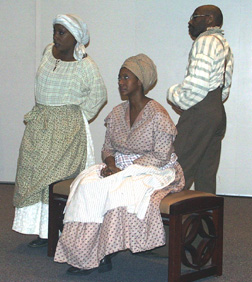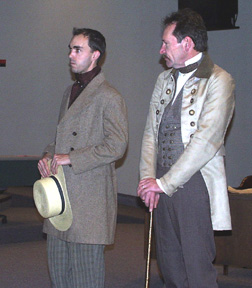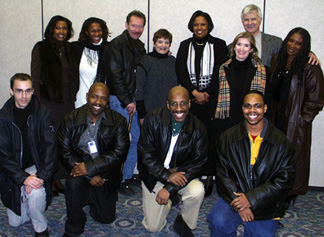 Dusty, often illegible petitions emit the voices of human beings being sold, owned or seeking redress. On Friday, UNMC employees journeyed to the 1800s in the wrenching and powerful documentary “Let My People Go: The Trials of Bondage in the Words of Master and Slave.”
Dusty, often illegible petitions emit the voices of human beings being sold, owned or seeking redress. On Friday, UNMC employees journeyed to the 1800s in the wrenching and powerful documentary “Let My People Go: The Trials of Bondage in the Words of Master and Slave.”
The 80-minute production, which premiered in 1997, draws from petitions to southern legislatures and county courts. The dramatic vignettes, woven together by the soulful harmony of a seven-person ensemble, capped UNMC/NHS Black History Month activities. About 150 people attended the performance on campus.
In one vignette, Caucasian residents ask the Tennessee legislature that the slave Jack be exempted from the law prohibiting slaves from practicing medicine. Dr. Jack, they said, possessed great medical skill. His office, located on Front Street, was featured in Nashville’s first business directory.
 In another petition, Amelia Green, a free woman of color, asks that her children be emancipated. In another, Lucy Andrews asks to be enslaved in order to join her husband and children. In yet another vignette, a Caucasian woman seeks a divorce from her slave-owning husband who is verbally abusive and unfaithful.
In another petition, Amelia Green, a free woman of color, asks that her children be emancipated. In another, Lucy Andrews asks to be enslaved in order to join her husband and children. In yet another vignette, a Caucasian woman seeks a divorce from her slave-owning husband who is verbally abusive and unfaithful.
The stories are based on documents taken from the Race, Slavery and Petitions Project Archives housed at the University of North Carolina at Greensboro. The archives contain photocopies of more than 17,000 petitions and 120,000 pages of documentary evidence. Collected over five years, the petitions come from courthouses and state archives across the South.
“To know the truth about slavery is very important,” said Loren Schweninger, professor of history at UNC Greensboro and director of the Race and Slavery Petitions Project. “The more we know about it the more we can deal with racial issues of today.”
 |
First row, from left, Harvey Robinson (cast), Wayne Houston, UNMC liaison to North Omaha, Juan Fernandez (cast), Che’k Peak, staff assistant UNMC Employee Relations; second row, from left, Cheryl Bowles, resource specialist, UNMC/NHS Community & Multicultural Affairs, Donna Baldwin (cast), Stephen Gee (cast), Brenda Schleunes (director), Valda Boyd Ford, director, UNMC/NHS Community & Multicultural Affairs, Deborah Kintzing (cast), Loren Schweninger (historian), Robin Doby (cast). |
In 1991, Schweninger began traveling the South visiting courthouses and state archives in search of legal petitions related to race and slavery. For more information on the project visit http://history.uncg.edu/slaverypetitions.
Stories from the documentary also are featured in Schweninger’s book, “The Southern Debate over Slavery: Petitions to Southern Legislatures, 1778-1864,” which was published by the University of Illinois Press in 2001.
Friday’s free performance at UNMC marked the troupe’s 72nd production, he said.